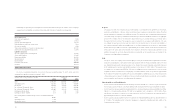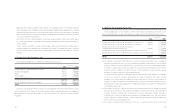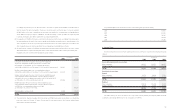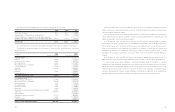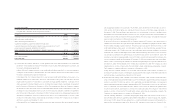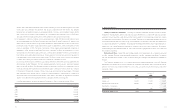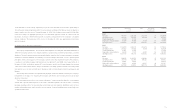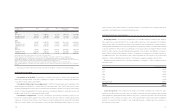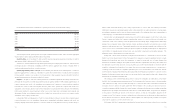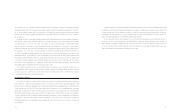LensCrafters 2003 Annual Report Download - page 62
Download and view the complete annual report
Please find page 62 of the 2003 LensCrafters annual report below. You can navigate through the pages in the report by either clicking on the pages listed below, or by using the keyword search tool below to find specific information within the annual report.
123122
dismiss certain other claims made by Lantis, leaving only the breach of contract claim. The Company in November
2000 filed its answer and counterclaim against Lantis. In December 2002, the parties entered into a mutual release
and settlement agreement and the case was dismissed with prejudice. This settlement did not have a material impact
on the Company’s consolidated financial statements for 2002.
In March 2002, an individual plaintiff commenced an action in the California Superior Court for the County of San
Francisco against LensCrafters, the Company’s subsidiary that operates as a licensed California vision health care
service plan, certain of the Company’s other subsidiaries and Luxottica Group S.p.A., alleging that the relationships
between those companies violate certain California statutes governing optometrists and opticians and constitute
unlawful or unfair business practices. The plaintiffs named in the second amended complaint seek certification of the
case as a class action, and remedies including an injunction against the allegedly unlawful practices, disgorgement
and restitution of allegedly unjustly obtained sums, and unspecified compensatory and punitive damages. The
defendants intend to defend against such claims vigorously.
In May 2001, certain former stockholders of Sunglass Hut International, Inc. commenced an action in the U.S.
District Court for the Eastern District of New York against the Company, its acquisition subsidiary formed to acquire
Sunglass Hut International and certain other defendants, on behalf of a purported class of former Sunglass Hut
International stockholders, alleging in the original and in the amended complaint filed later, among other claims, that
the defendants violated certain provisions of U.S. Securities Law, and the rules thereunder in connection with the
acquisition of Sunglass Hut International in a tender offer and second-step merger, by reason of entering into a
consulting, non-disclosure and non-competition agreement, prior to the commencement of the tender offer, with the
former chairman of Sunglass Hut International, which purportedly involved paying consideration to such person for his
Sunglass Hut International shares and his support of the tender offer that was higher than that paid to Sunglass Hut
International’s stockholders in the tender offer.
The Company and the other defendant filed a motion to dismiss the complaint in its entirety which, on November
26, 2003, the Court granted in part and denied in part. The Court granted the Company’s motion to dismiss plaintiffs'
claim under Section 10(b) of the Securities Exchange Act of 1934 and Rule 10b-5 thereunder, but denied the
Company’s motion to dismiss the claims under Rule 14d-10 relating to the consulting, non-disclosure and non-
competition agreement with Mr. Hauslein, the former Chairman of Sunglass Hut International, and aiding and abetting
alleged breaches by Sunglass Hut International former directors of their fiduciary duties, noting that it was obligated,
for the purpose of rendering its decision on the motion to dismiss, to treat all of the plaintiffs' allegations in the
complaint as true. The Company continues to believe that the claims that were not dismissed are without merit and
that its defenses are meritorious, and will continue to defend against such claims vigorously. However, the Company
can provide no assurance as to the outcome of the case.
In December 2002, the Company was informed that the Attorney General of the State of New York is conducting
Future minimum annual rental commitments for operating leases are as follows (thousands of Euro):
Years ending December 31,
2004 167,505
2005 130,373
2006 116,855
2007 89,622
2008 67,713
Subsequent Years 107,925
TOTAL 679,993
Total rent expense under operating leases for the years ended December 31, 2001, 2002, and 2003, aggregated
203.7 million, 276.5 million and 260.3 million, respectively.
Credit Facilities - As of December 31, 2002, and 2003, Luxottica Group had unused short-term lines of credit of
approximately 308.1 million and 271.8 million, respectively.
These lines of credit are renewed annually and are guaranteed by the Company. At December 31, 2003, there was
no principal amount of borrowings outstanding and 18.5 million in aggregate face amount of standby letters of
credit outstanding under these lines of credit (see below).
Outstanding Stand-by Letters of Credit - A U.S. subsidiary has obtained various stand-by letters of credit from
banks that aggregate 21.2 million as of December 31, 2003. Most of these letters of credit are used for security in
risk management contracts or as security on store leases. Most contain evergreen clauses under which the letter is
automatically renewed unless the bank is notified not to renew.
Litigation - On April 22, 2003, the Company entered into a settlement agreement with Oakley, under which two
previously reported patent and intellectual property lawsuits brought by Oakley in 1998 (originally against Bausch &
Lomb Incorporated and certain of its subsidiaries and assumed by the Company in connection with the acquisition
from Bausch & Lomb in 1999 of the Ray-Ban business) and in 2001, against the Company and certain of its
subsidiaries, each in the U.S. District Court for the Central District of California were settled. As part of the settlement,
neither party admitted to any wrongdoing in either case, and all claims and counterclaims were released and
discharged. Further, the preliminary injunction that Oakley had obtained in the second case against certain
subsidiaries of the Company was dissolved.
In November 1999, Lantis Eyewear, Inc. (“Lantis”), a former distributor of Bausch & Lomb, filed a complaint against
Luxottica Group and one of its subsidiaries claiming that, in terminating its distribution agreement with Lantis, the
Company allegedly breached the agreement. In October 2000, the Court granted a motion by Luxottica Group to


